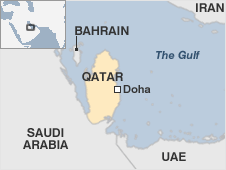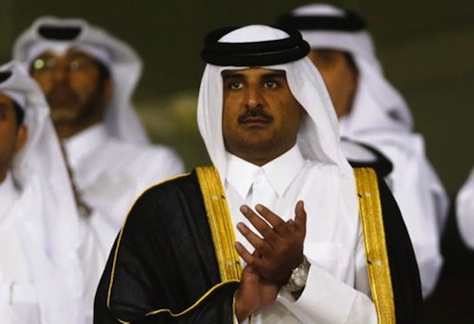Even as a global audience cheers on the 2014 World Cup in Brazil, things are looking increasingly dicey for Qatar, which is struggling to hold onto its successful bid four years ago to host the 2022 World Cup.![]()
Amid complaints about everything from soaring Gulf temperatures to its LGBT laws to the abuses of Qatar’s kafala system, the resource-wealthy emirate now faces losing the 2022 World Cup altogether following allegations that Qatari businessmen bribed members of the Fédération Internationale de Football Association (FIFA).
Needless to say, it’s not been an incredibly smooth first year for Tamim bin Hamad Al Thani, who assumed power as the eighth emir of Qatar when his father, Hamad bin Khalifa Al Thani, abdicated in June 2013 at the age of 61. Though the British-educated Tamim had been the Qatari heir apparent for a decade, at age 34, he is the world’s youngest monarch. Though Shiekh Hamad and other members of the Al Thani family (most notably Tamim’s mother, Mozah bint Nasser Al Missned) continue to wield significant influence, Sheikh Tamim’s rise to power reflects a more seamless transition for Qatar. Sheikh Hamad kicked his own father, Khalifa, out of power in a bloodless coup in 1995.
Though he wasn’t Qatar’s emir at the time, the controversy surrounding the decision to award the World Cup to Qatar has become a major leadership test for Sheikh Tamim (pictured above), who led the Qatari committee that made the bid for the 2022 World Cup. Arguably, Tamim’s most important role before assuming the emirship last year was his influence in building Qatar’s growing sponsorship of regional and global sports events.
Facing a humiliating retreat with respect to Qatar’s regional political agenda, and facing enhanced global scrutiny on all fronts due to the World Cup bid, losing the 2022 tournament would be a massive setback for Qatar’s two-decade push to become an influential regional and global actor.
 A peninsula jutting off the much larger Arabian peninsula along the Persian Gulf, just northwest of the United Arab Emirates, neighboring Saudi Arabia to the south, Qatar was a British protectorate throughout the 20th century until its independence in 1971.
A peninsula jutting off the much larger Arabian peninsula along the Persian Gulf, just northwest of the United Arab Emirates, neighboring Saudi Arabia to the south, Qatar was a British protectorate throughout the 20th century until its independence in 1971.
With massive oil reserves and the world’s third-largest natural gas reserves, Qatar has become one of the world’s wealthiest countries, given that it holds a population of just 2.15 million people, less than half of whom are actually Qatari citizens. Doha, the capital, is one of the most cosmopolitan cities in the Middle East, second only to Dubai in international finance, despite its relative conservatism. Alcohol use is still largely restricted, and Qataris are even more conservative than Emiratis, generally speaking.
Under Sheikh Hamid, the seventh emirate of the Al Thani family, which has more or less ruled Qatar since the 1820s, in conjunction with first Ottoman, then British, rule before independence, the country has strived to make a global impact. Sheikh Hamid’s 18-year emirship created Al Jazeera, the most respected television station in the Middle East, and developed global partnerships with international cultural and educational institutions, from Cornell University to Georgetown University to the Brookings Institution. Doha’s Museum of Islamic Art, designed by I.M. Pei, is one of the world’s most impressive.
Sheikh Hamid also increased the country’s natural gas production, deepened the infrastructure that’s transformed Qatar into a regional and aspiring global financial hub, and created of the Qatar Investment Authority, which today is estimated to have around $170 billion in assets under management, making it one of the world’s most influential sovereign wealth funds.
With a GDP per capita of $100,260 last year, according to the International Monetary Fund, Qatar is by far the richest country in the Middle East, and it views with Luxembourg and Norway as one of the wealthiest countries in the world.
Qatar facing more than just criticism over bribing FIFA officials
FIFA now faces calls to rerun the bidding process for 2022 after allegations that Mohamed bin Hammam, a Qatari businessman and former member of the FIFA executive committee, paid other FIFA officials up to $5 million in gifts and cash to secure the 2022 tournament for Qatar. The bribery has reopened many of the original complaints about the Qatari bid, forcing Sheikh Hamid, now the still-influential emir-emeritus, to take to the pages of The Guardian a few days ago to make the case for Qatar’s bid.
Football enthusiasts note that Qatar’s national teams has never qualified for an actual World Cup match. But there’s no doubt that football has a wide audience throughout the Middle East, and Qatar pitched its bid as a historical opportunity for the region to host its first World Cup.
LGBT activists howled about Qatar’s selection as well, and they and many others derided FIFA president Sepp Blatter unhelpfully suggested that LGBT contestants and fans ‘refrain from sexual activities’ during the 2022 tournament. Though Qatar’s laws are hardly ideal, it’s hard to think of any Middle Eastern countries, other than Israel, that meet the highest international human rights standards for LGBT freedoms. Though homosexuality is illegal in Qatar (for males, at least), that’s not uncommon in the Gulf — for example, homosexuality still carries the death penalty in Saudi Arabia. Unlike sub-Saharan Africa or Russia, which was awarded the 2018 World Cup, Qatar hasn’t gone out of its way recently to impose new, expressly discriminatory anti-LGBT laws.
Qatar’s scorching summer temperatures, with an average high of 106°F in June and July, also pose a practical difficulty. Though Qatar argued that it could develop cooling technology for the various football stadia, it’s a technique that’s never been applied before, which could subject players and fans alike to extraordinary — and possibly dangerous — levels of heat. Fans also bemoan Qatari restrictions on sale and use of alcohol, and security officials this week highlighted that Qatar’s location presents an additional threat of terrorist attack.
Labor activists and journalists have highlighted what’s perhaps the most serious human rights abuse issue today in Qatar, the kafala system. Common among Gulf countries, the system provides a means of sponsorship by Qatari employers for foreign workers, mostly in construction and other labor-intensive jobs. Critics have long pointed to abuses, noting that workers often have their passports confiscated and are restricted from changing jobs or even returning to their home countries. At worst, they argue that the kafala system amounts to forced labor.
In the Qatari context, reports of laborer deaths, due to poor working conditions and the extreme heat, placed the country’s labor laws under additional scrutiny. To its credit, however, the Qatari government has agreed to a set of reforms that should make it easier for workers to return home and that will provide a greater emphasis on employee welfare. Watchdogs argue that the reforms don’t go far enough, and it remains to be seen if the new laws will be vigorously enforced. Bahrain, an oil-rich island kingdom just northwest of Qatar, ended its kafala system to great fanfare in 2009, but worker rights there remains somewhat precarious.
Blatter, FIFA’s president, recently called the decision to award the tournament to Qatar a ‘mistake,’ but it’s not clear that the bribery is so much a Qatari problem as an endemic FIFA problem. Russia, which won the 2018 tournament at the same time as Qatar was awarded the 2022 tournament, has also faced bribery concerns. From anti-gay legislation to political and press freedom concerns to xenophobia to the waste and corruption involved with hosting the 2014 Winter Olympics in Sochi earlier this year to Russia’s more recent annexation of Crimea, the Russian 2018 bid is potentially even more problematic, and no one’s arguing that FIFA should rescind that bid.
There’s no direct precedent for revoking a World Cup bid, though Colombia voluntarily gave up the 1986 tournament in the face of worsening drug-related violence and political terrorism. FIFA ultimately awarded that tournament to Mexico instead. In this case, Qatar would almost certainly pursue legal action against FIFA in any number of global forums, potentially dragging FIFA and the entire bidding process through even more sordid exposure.
FIFA scrutiny follows collapse of Qatari regional clout
If FIFA moves to withdraw Qatar’s bid, it would be a historic slap in the face of Qatari leadership that, over the course of Sheikh Hamad’s emirship, increasingly used the country’s wealth to punch above its weight as a regional leader. An early champion of various Arab Spring movements, including the Bengahzi-based rebels who ultimately forced Libya’s president Muammar Gaddafi out of power after over four decades, and a financial sponsor of both Egyptian president Mohammed Morsi and anti-Assad rebels in Syria, Qatar has today become something of a pariah among the Arabian peninsula’s Gulf Cooperation Council.
Though the reasons for Sheikh Hamad’s abdication last year are opaque in a country where governance isn’t incredibly transparent, the backlash from Arabian neighbors, most notably Saudi Arabia, must have played at least some role. Two years ago, with Morsi and the Muslim Brotherhood ascendant in Egypt, and with a broad-based Sunni rebel force legitimately challenging Syrian president Bashar al-Assad for control of much of Syria, Qatar was riding the crest of what seemed like incredibly prophetic decisions to back the face of the Middle East’s new leadership.
It seemed like the latest example of what seemed like a magical touch on foreign and global policy that owed as much to Hamad bin Jassim bin Jaber Al Thani, Qatar’s foreign minister from 1992 to 2013 and prime minister from 2007 to 2013.
Sheikh Hamad managed to build strong relationships with the Shiite leadership of the Islamic Republic of Iran, all while hosting US military forces that played a key role not only in the 1991 efforts to liberate Kuwait, but the more controversial 2003 US-led invasion of Iraq. Qatar has relatively civil ties with Israel, notwithstanding the fact that it has delivered millions in aid to Hamas, the Palestinian group that controls the Gaza Strip and that US and Israeli officials dismiss as a terrorist group.
By the time Sheikh Hamad abdicated, however, Morsi was on his way to being overthrown in a coup by the Egyptian military, and hardcore Islamists were challenging the more moderate anti-Assad forces in Syria.
Egypt’s former army chief of staff Abdel Fattah El-Sisi was ‘elected‘ president last month, just as Assad was ‘reelected‘ in June. As infighting increasingly incapacitated Sunni rebel forces, Assad has now gained control over Syria today than at any time since 2011. Riyadh, which has eclipsed Qatar in influencing the anti-Assad rebels, and which firmly supports El-Sisi, is now in the driver’s seat, and the Saudi kingdom is pressuring Qatar to fall in line with the rest of the Gulf on regional affairs, even withdrawing its ambassador from Doha earlier this spring.
Almost overnight, Qatar receded from a role as a key regional player into a regional outlier with few friends — in Riyadh, Baghdad, Tehran or Dubai — and it seems very unlikely that Qatar will regain that stature anytime soon.
If Qatar suffers the further indignity of losing the 2022 World Cup, it will jeopardize the gains of the past two decades altogether. Though the emirate’s oil and gas wealth should be enough to shield Sheikh Tamim from internal political dissent, the unraveling of Qatar’s World Cup hopes, in tandem with its regional setbacks, could force him to retreat to more domestic concerns.
